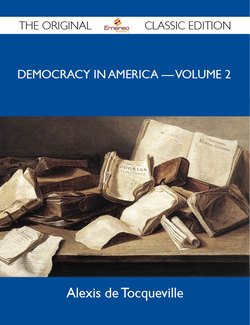Democracy in America ? Volume 2 - The Original Classic Edition

Описание книги
Alexis de Tocqueville looks at the United States and examines its political, social, and cultural intricacies in DEMOCRACY IN AMERICA. This edition of DEMOCRACY IN AMERICA is well introduced and translated. This is not a basic travelogue of a French aristocrat -Intellect – statesmans journey through the American wilderness in a span of nine months, but it is a significant documentary that compares and contrasts European Aristocracy to American Democracy. At the time that Tocqueville wrote DEMOCRACY IN AMERICA, both Europe and the United States experienced an enormous shift in its political and social structure. On the US side, several events occurred, Andrew Jackson was president, the Anti-Slavery movement, Indian Removal commenced, immigration was on the rise, and the industrial age was emerging; for the French and European side, the Revolution of 1830 and autocracy took precedence as well as a radical shake-up of the social class. Possibly, for Tocqueville his travels to the United States served as a respite from Frances revolutionary tendencies, and the opportunity to observe US history in the making. In terms of chronology, 55 years after the signing of the Declaration of Independence and 30 years before the Civil War. In essence, Tocquevilles accounts bear much significance to how the United States progressed, and where it was headed. <p> Tocqueville writes and thinks in a Jeffersonian stance. Throughout DEMOCRACY IN AMERICA Tocqueville suggests that productivity cannot occur while a man remains idle, and that action must take place in some form or another – the rule of law or through communication. No doubt, this annotates Jeffersonian politics and ideology. However, the basic premise throughout the book concentrates on the difference between Democracy and Aristocracy and their relationships to the social classes of each respective ideology, and how each accomplished and achieved effectiveness. Tocqueville looked toward America as a model to post-revolutionary France, and one may say that this was an exchange of politics and ideas that the United States had done a century before; this was a shared entity. <p> DEMOCRACY IN AMERICA should be required reading. The most exemplary aspect of the book is how Tocqueville speaks rhetorically in a no nonsense way as well as its timelessness, which will further entice readers to read on. As an added treat, the appendices and the two most important essays of the book pertaining to Tocquevilles encounters with the Iroquois and Chippeway Indians should not be overlooked.
Отрывок из книги
DEMOCRACY IN AMERICA By Alexis De Tocqueville
Translated by Henry Reeve
.....
of the United States more particularly distinguished one, to which they were closely united by a common origin and by kindred habits. Amongst this people they found distinguished men of science, artists of skill, writers of eminence, and they were enabled to enjoy the treasures of the intellect without requiring to labor in amassing them. I cannot consent to separate America from Europe, in spite of the ocean which intervenes. I consider the people of the United States as that portion of the English people which is commissioned to explore the wilds of the New World; whilst the rest of the nation, enjoying more leisure and less harassed by
the drudgery of life, may devote its energies to thought, and enlarge in all directions the empire of the mind. The position of the Americans is therefore quite exceptional, and it may be believed that no democratic people will ever be placed in a similar one. Their strictly Puritanical origin--their exclusively commercial habits--even the country they inhabit, which seems to divert their minds from the pursuit of science, literature, and the arts--the proximity of Europe, which allows them to neglect these pursuits without relapsing into barbarism--a thousand special causes, of which I have only been able to point out the most important--have singularly concurred to fix the mind of the American upon purely practical objects. His passions, his wants, his education, and everything about him seem to unite in drawing the native of the United States earthward: his religion alone bids him turn, from time to time, a transient and distracted glance to heaven. Let us cease then to view all democratic nations under the mask of the American people, and let us attempt to survey them at length with their own proper features.
.....
